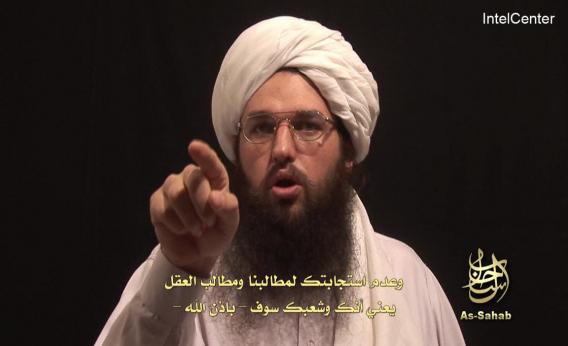The headline’s a bit of a ruse, sorry. Al-Qaida didn’t get the media. The biggest barrel o’ yuks in the Combating Terrorism Center’s new document trove is the January 2011 memo from Adam Gadahn, Azzam the American. As Spencer Ackerman charitably puts it, Gadahn “tracked the press like he worked for Fishbowl DC.” Read: Not very well. His memo began with sound advice for bin Laden not to refer to Benjamin Franklin as a president – “we should remind that (Benjamin Franklin) was not a president, but a “statesman.”
When bin Laden did speak, he should know – the media was moving on from war coverage.
Irrespective of the passing of the midterm elections, the timing now is very suitable for the Shaykh [bin Laden] to show with this speech. This is because all the political talk in America is about the economy, forgetting or ignoring the war and its role in weakening the economy. Just as what a Pakistani journalist residing in America has said, that the press conference held by Obama after the midterm elections, all the questions were on the bad economy, and the means to get out of the crisis. Nevertheless not one of the journalists dared to embarrass Obama by questioning him about the influence on the American budget and the national economy of spending the billions yearly on the two wars of Afghanistan and Iraq.
So: Where should bin Laden speak? Gadahn analyzed the three cable networks for him. “From the professional point of view, they are all on one level – except (Fox News) channel which falls into the abyss as you know, and lacks neutrality too.” Later, he would rule out Fox News as an outlet for the anniversary interview: “Let her die in her anger.”
CNN was passable. “It seems to be in cooperation with the government more than the others (except Fox News of course),” wrote Gadahn. “Its Arabic version brings good and detailed reports about al-Sahab releases, with a lot of quotations from the original text. That means they copy directly from the releases or its gist. It is not like what other channels and sites do, copying from news agencies like Reuters, AP and others.”
MSNBC was disappointing. “I used to think that MSNBC channel may be good and neutral a bit,” Gadahn wrote, “but it has lately fired two of the most famous journalists –Keith Olberman and Octavia Nasser the Lebanese – because they released some statements that were open for argument.” This mischaracterizes why Olbermann left MSNBC (the public feud, before his departure, was over his undisclosed donations to Democrats) and ignores the fact that Nasser worked for CNN.
What about CBS? “It has a famous program (60 Minutes) that has some popularity and a good reputation for its long broadcasting time,” wrote Gadahn. “Only God knows the reality, as I am not really in a position to do so. ABC channel is all right; actually it could be one of the best channels, as far as we are concerned. It is interested in al-Qaida issues, particularly the journalist Brian Ross, who is specialized in terrorism. The channel is still proud for its interview with the Shaykh. It also broadcasted excerpts from a speech of mine on the fourth anniversary, it also published most of that text on its site on the internet.” Good stuff, but “in conclusion, we can say that there is no single channel that we could rely on for our messages.”
So, nobody could get a exclusive. This was what Gadahn wanted to deliver. What if they set up “a special interview with Shaykh Usama or Shaykh Ayman, and with questions chosen by the channel, and with a good camera?” Why, then “we might find a channel that would accept its broadcasting. But they would accept this time, so as to get an exclusive press scoop: The first press interview of Shaykh Usama or Shaykh Ayman since 10 years ago! Particularly if the Shaykh is the one to be interviewed.” No one network would get it. “I suggest that we should distribute it to more than one channel, so that there will be healthy competition between the channels in broadcasting the material, so that no other channel takes the lead.”
Alas, we know the ending. Adam Gadahn’s PR client never got to do the interview.
